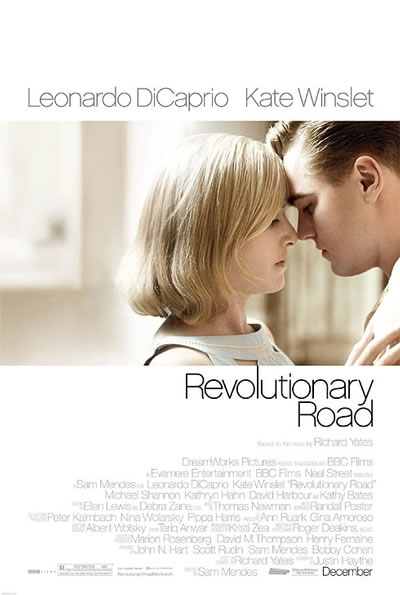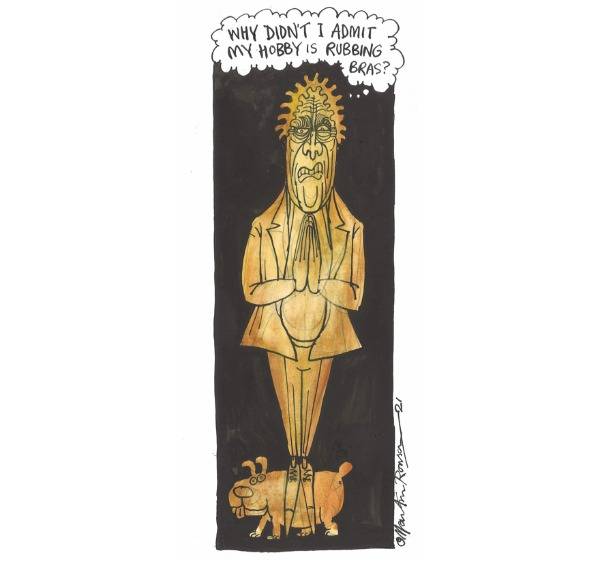 How appropriate that, after all these years, Kate and Leo meet again. And you know what? They're both still crazy as ever. Titanic, for all its faults, was a proper film. It was a film that had more passion and tension in one shot than than Revolutionary Road has in its interminable one hour and fifty nine minutes. Titanic was a film that had one beautiful, brilliant enduring image – not that of the boat sinking or the lovers standing on the prow, but Kate's (or was it Leo's?) hand sliding down the steamy car window, a perfect, provocative representation of their moment of passion. The sex scenes in Revolutionary Road, on the other hand (there are two of them, and they are almost identical) involve two people, fully clothed, lying on top of one another for no more than 30 seconds, while exhaling deeply and moving ever so slightly, before inelegantly raising themselves off of their lover. How often this can be said of a film, I don't know, but the poor quality of the sex scenes in Revolutionary Road are an encapsulation of the poor quality of the film itself.
How appropriate that, after all these years, Kate and Leo meet again. And you know what? They're both still crazy as ever. Titanic, for all its faults, was a proper film. It was a film that had more passion and tension in one shot than than Revolutionary Road has in its interminable one hour and fifty nine minutes. Titanic was a film that had one beautiful, brilliant enduring image – not that of the boat sinking or the lovers standing on the prow, but Kate's (or was it Leo's?) hand sliding down the steamy car window, a perfect, provocative representation of their moment of passion. The sex scenes in Revolutionary Road, on the other hand (there are two of them, and they are almost identical) involve two people, fully clothed, lying on top of one another for no more than 30 seconds, while exhaling deeply and moving ever so slightly, before inelegantly raising themselves off of their lover. How often this can be said of a film, I don't know, but the poor quality of the sex scenes in Revolutionary Road are an encapsulation of the poor quality of the film itself.
Of course, the other parent of the bastard child that is Revolutionary Road is Sam Mendes and, more specifically, the feted American Beauty, a film so bad that the turning point of its plot hung on a visual gag of misunderstanding so unsubtle that the Marx Brothers would have rejected it. To be clear, Revolutionary Road is not a proper film. American Beauty is more of a film than Revolutionary Road. As is Airplane or Ace Ventura: Pet Detective or Ghostbusters. Those are films that, at least, understand and embrace the qualities of their medium. Revolutionary Road, on the other hand, shies away from cinema, preferring to be a nice, stolid literary adaptation of a book that soon half the population of the London Underground will be reading. It is crammed full of images that will be no shock to anyone who has ever seen a painting by Edward Hopper (to whom just as much debt is owed as Richard Yates) and lines of such clunking obviousness that many of the actors, Michael Shannon in particular, seem to be fighting against the script. Yes, it has good performances; Leo's is better than Kate's, because he isn't so obviously acting. When he moves, shark-like around the backstage of his wife's play, he is totally enrapturing. Except for the fact that he looks about twelve, and so was probably the worst casting decision the filmmakers could have made, apart from, perhaps, Robin Williams. This is a problem particularly pertinent when he's crying, because all of a sudden he looks like a teenager whose parents have banned his Xbox.
The themes, such as they are, are solid too, but again, won't be a shock to anyone who hasn't seen Blue Velvet, or, indeed, Short Cuts, a film in which marital strife is laid bare in a much more affecting way than Revolutionary Road. Ultimately, like the sex scenes, Revolutionary Road goes nowhere. Perhaps Yates should have called it Revolutionary Cul De Sac. But then, he probably had a better sense of irony than Sam Mendes. Before it has even properly begun, it is clear that it won't end well for Leo or Kate and after half an hour it is clearer still that what would be more affecting is a snapshot of a marriage going clearly down the toilet - like you might get in one of Robert Altman's vignettes from Short Cuts, or in an Edward Hopper painting - rather than a two hour film. As it is, the marriage is so dependable in its volatility, and shows so little passion (that emotion for which cinema is so well suited) to contrast with the pain that it degenerates into a wait for the next fight, a glance at one's watch or one's shoes, a fumble to the bottom of the pick n' mix packet, a desire to do anything other than watch a film that runs so determinedly into the brick wall of stolidity.

